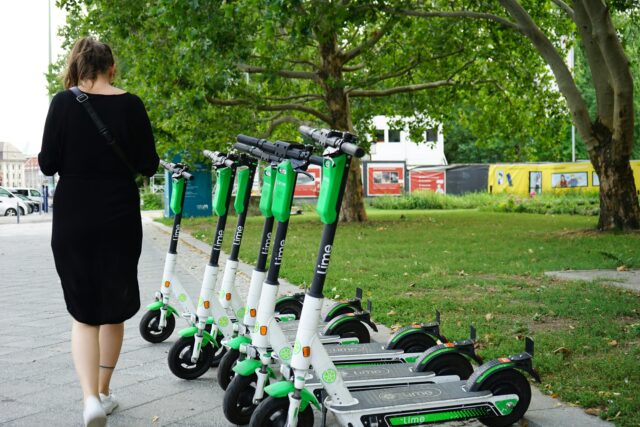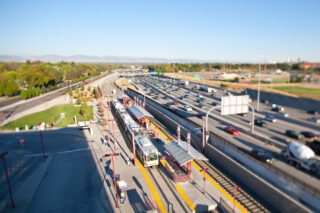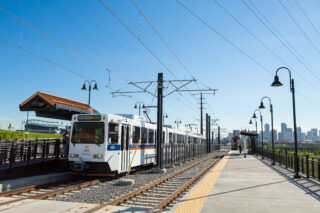Denver Program Will Provide Free Lime and Bird First Mile Connections
by Odochi Akwani, Writer and Content Manager
September 25, 2025
A grant from the Regional Transportation District will automatically provide about $5 in savings for anyone taking shared micromobility to two stations.

A two-year pilot program called First Mile Free will launch in Winter 2026 to address gaps in Denver’s transportation landscape and offer free Lime and Bird rides of up to a mile to two Regional Transportation District (RTD) stations.
This idea began in a University of Denver graduate class called Sustainable Transportation. Students had to propose a policy that would benefit Denver’s public transportation system. Joel Cox, an environmental policy graduate student in this class, took this broad assignment and thought of his own commute and how it could be made more efficient.
Cox lives about a mile from the University of Denver station. He says it’s too far of a walk most days. “I realized I’m not alone,” says Cox. “A lot of people live too far from a transit station. 75% of people in Denver don’t live within walking distance to transit. So I asked myself, ‘How do I close this gap as efficiently as possible?’
Thus came the idea for First Mile Free. After Cox researched and completed the assignment, he wanted to see if it could come to life. He started pitching elected officials, going to government agencies, and pitching the idea, then turned to grassroots advocacy and pitching to nonprofits and doing public surveys in hopes of showing how this wasn’t just one person’s idea, but something that could benefit the community.
“A ride with First Mile Free generates 65% less emissions than a ride if someone used a private vehicle the entire trip,” says Cox. “This has many benefits, everything from safety to environmental to saving people time and money. That speaks volumes for a program that’s as cost-efficient as First Mile Free.”
When Cox saw the RTD Partnership Program, a grant program established to help communities meet local mobility needs through transportation pilots of their own design, he jumped at the opportunity to bring this project to life.
“In evaluating projects to support with Partnership funding, equity is one of several factors that are considered, along with the proposal’s alignment with RTD’s Strategic Plan, local support for the project, whether the project provides mobility where there is a gap in or complements existing service, potential ridership of the project, and project’s readiness to launch in a timely manner,” says says Cory Schmitt, RTD project manager, partnerships.
With this in mind, Cox partnered with the West Corridor Transportation Management Association, a West Line Corridor Collaborative project. The grant program, by its name, requires a partnership, specifically with a Transportation Management Association (TMA). West Line Corridor Collaborative Executive Director Michael Hughes worked with Cox to fine-tune the logistics of the project, collect letters of support, and present it to RTD. They received news that their project was selected in early August of this year.
“We want cars to be a choice, not a must,” says Hughes. “It shouldn’t be the only way people can travel. And so we got a lot of work to do to bring other modes of transportation on par with the ease and convenience of driving a car.”
The two stations selected for this pilot were strategically chosen because they serve very different populations. The University of Denver station is in a higher-income area and serves many students and faculty. The Decatur-Federal station lies within Denver’s Sun Valley neighborhood, one of the most underserved areas in the city.


University of Denver Station (left) and Decatur-Federal Station (right) photographs provided courtesy of RTD
The mission of West Line Corridor Collaborative is to ‘attract quality investment and support livable communities along the West Line light rail corridor.’ Much of their work involves working with the Denver Housing Authority, specifically in the Sun Valley neighborhood. Hughes hopes this pilot benefits the folks he works with as the Denver Housing Authority moves people from these older buildings in the city into brand new ones, creating more density in this neighborhood.
“We want to help the people who live in those buildings and who get their housing through the Denver Housing Authority to be able to save all the money they would otherwise be spending to travel to do the things they need to do,” says Hughes.
Hughes and Cox both hope to see an increase in scooter and bike usage ending at the stations. They plan to use earned media, in-app ads with Lime and Bird to target people within a mile of the stations, and community outreach through registered neighborhood organization email lists, neighborhood Facebook groups, and other hyperlocal channels residents are already tapped into.
“We’ll look for a year-over-year increase, and then we will also use in-app surveys, says Cox. “As soon as someone ends the trip, we can point-blank ask them whether or not First Mile Free was the reason they are using public transit.”
Although the pilot won’t launch till the end of next year, Cox is already thinking beyond the pilot.
“If this is successful, I hope to scale it citywide, and once scaled citywide, I think we’re going to be a city that is much more able to reach public transit, and that means people have more time in their day,” says Cox.
___________________________________________________________________________________________
The Better Bike Share Partnership is funded by The JPB Foundation as a collaboration between the City of Philadelphia, the National Association of City Transportation Officials (NACTO), and the PeopleForBikes Foundation to build equitable and replicable bike share systems. Follow us on LinkedIn, Facebook, Twitter, and Instagram, or sign up for our weekly newsletter.
Have a question or a story idea? Email odochi@peopleforbikes.org.
